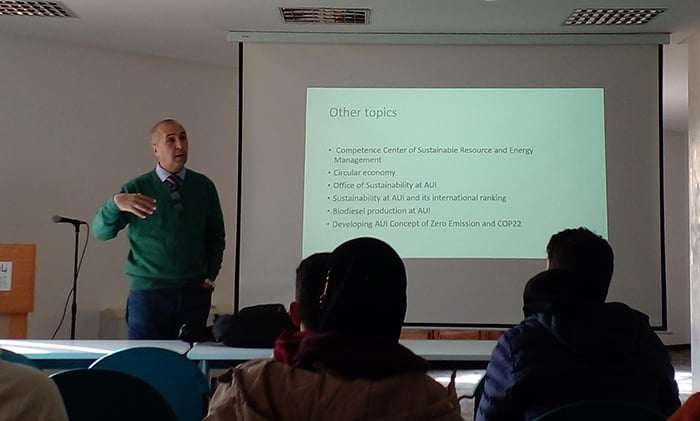
The AUI Sustainability Club, led by the club advisor and professor, Dr. Yousra Chtouki, Ssi Samir Ouzir, and the club president, Engineering major Fatima Zohra Belhadj, ran its first edition of Sustainability Week Ifrane (SWI) from the 19th to the 26th of March. The Sustainability Week is a concept that originates in Switzerland and aims to encourage higher education institutions (HEIs) to become sustainability role models for their cities and local region through the planning and execution of a week-long series of student-led events that bring awareness of sustainability issues in the economy, society, and environment outside of the classroom and into the local community. This is a way of spreading knowledge to other people in the area who may not have access to this research or mindsets, as well as helping the community work together to find sustainable solutions.
The Sustainability Week Ifrane launched on Saturday, the 19th of March, with a hike to Zroga, a local mountain Ifrane, and an educational tour where participants learned about the local fish and plants in the area. The following day, Madame Nissrine Mhamdi Alaoui, owner of Magies du Terroir, which employs local women in Ifrane and sells sustainable hygiene products, gave a three-hour lecture on the company and how these items are made, as well as the importance of using natural ingredients both to not harm the environment and our bodies. She then led a 5-day workshop series where she taught participants how to make soap, deodorant, shampoo bars, toothpaste, and lip balms out of natural ingredients. In addition, Madame Nissrine and her staff from Magies du Terroir had a stand in front of Building 3 throughout the week, where they sold their products on campus.
On Tuesday, the 22nd of March, SWI held a lecture series, where professors such as Dr. Muhammad Ikram, Dr. Brian David Seilstad, and PhD student Bouali Ettaibi shared their research on sustainability-related topics in their fields of management, culture and linguistics, and engineering, respectively. The event was largely attended by local farmers, who came to see Ettaibi's presentation and engage in a discussion with local agriculture authorities, such as Mr. Abdelhahik, Provincial Director of Agriculture in Ifrane; Ms. Zoubida Aaouich, member of the Fes-Meknes region council; Mr. Lkhsem Mustafa, President of the municipal council of Imouzzer Kandar; Mr. Hassan Ouassou, President of the association Ich N Akki for development, Mr. Hicham Afifi, President of the municipal council of Ifrane; Ms. Halima Zoumi, Vice-President of the Fes-Meknes region council; and Ms. Boutayna Atta-allah, journalist. Dr. Ikram adapted his lecture to explain the United Nations' (UN) seventeen Sustainable Development Goals (SDGs) and engage with the farmers present (with the translation help of one of his students). Dr. Seilstad then gave a lecture on the intersection of education, ethnography, and sustainability. Afterward, Ph.D. student Bouali Ettaibi presented the research he's been doing on smart farming, in which he installs sensors in the soil to measure the humidity of the soil and thus determine (along with analyzing the weather forecasts) how much water is needed to maintain the crops at a healthy medium. The farmers and representatives were then able to engage in a discussion, sharing their ideas on how they could adapt this technology in their own farms and thus improve the efficiency and effectiveness of the irrigation on their farms.
The week culminated in a "Free Store" and award ceremony on Sunday, the 27th of March, where the volunteers and speakers were presented with certificates in appreciation of the hours they volunteered throughout the week. The "Free Store" was organized in collaboration with Sanae Lahgazi Alaoui, an alumnus of the Al Akhawayn School of Ifrane (ASI) who currently works for an Atlanta-based non-profit called Mama Fund and organized several free stores with a collective she is a part of in Atlanta. The idea behind the free store was to get people to reflect on what they own, identify what they no longer use or need, and donate it to people who can continue to get some use out of it, instead of throwing it away. In this sense, the activity was an effort to help overcome economic obstacles some people in the local community may be facing (as it is redistributing resources) and most importantly, encourage the participants to not be so wasteful and throw away things simply because they may no longer see a use for them, when another person in the same community may very well need it.
This was the first edition of the Sustainability Week Ifrane, and the first Sustainability Week to be held in Morocco. Sustainability Week Ifrane is directly overseen by Sustainability Week International, which manages independent Local Sustainability Weeks (LSWs) around the world (outside of Switzerland), as well as other national Sustainability Week organizations, such as Sustainability Week Pakistan and Sustainability Week Switzerland.
